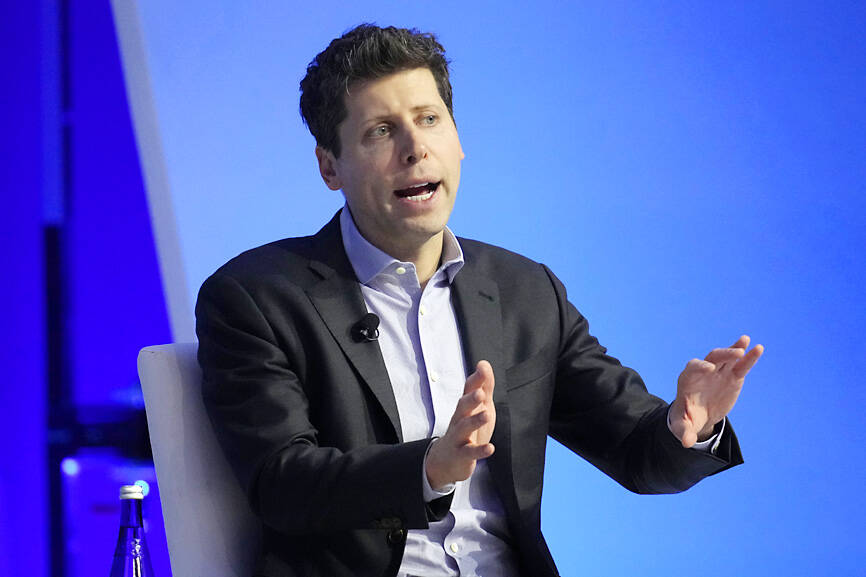Microsoft Corp CEO Satya Nadella yesterday announced the hiring of OpenAI’s (OAI) Sam Altman and other members of his team, days after the cofounder of the venture behind ChatGPT was fired.
OpenAI’s board sacked Altman on Friday, with US media citing concerns that Altman was underestimating the dangers of its tech and leading the company away from its stated mission — claims his successor as CEO has denied.
Altman shot to fame with the launch of its artificial intelligence (AI) chatbot last year, which ignited a race to advance AI research and development, with billions being invested in the sector.

Photo: AP
Nadella wrote on X, formerly Twitter, that Altman “will be joining Microsoft to lead a new advanced AI research team,” along with OpenAI cofounder Greg Brockman and other colleagues.
“The mission continues,” Altman posted on X.
Altman’s sacking triggered several other high-profile departures from the company, as well as a reported push by major investors to bring him back.
Microsoft was among several high-profile OpenAI investors that were trying to restore Altman as CEO, US media reported.
Yet OpenAI stood by its decision in a memo sent to employees on Sunday night, saying that “Sam’s behavior and lack of transparency ... undermined the board’s ability to effectively supervise the company,” the New York Times reported.
OpenAI appointed Emmett Shear, a former chief executive of Amazon.com Inc’s Twitch streaming service, as interim CEO, he wrote in a post on X yesterday.
Shear also denied reports that Altman had been fired over safety concerns regarding the use of AI.
“Today I got a call inviting me to consider a once-in-a-lifetime opportunity: to become the interim CEO of @OpenAI. After consulting with my family and reflecting on it for just a few hours, I accepted,” he wrote.
“Before I took the job, I checked on the reasoning behind the change. The board did not remove Sam over any specific disagreement on safety, their reasoning was completely different from that,” he added.
Microsoft CEO Nadella wrote in his post that “we look forward to getting to know Emmett Shear and OAI’s new leadership team and working with them.”
“We remain committed to our partnership with OpenAI and have confidence in our product roadmap,” he said.
Microsoft has invested more than US$10 billion in OpenAI and has rolled out the AI pioneer’s tech in its own products.

Semiconductor business between Taiwan and the US is a “win-win” model for both sides given the high level of complementarity, the government said yesterday responding to tariff threats from US President Donald Trump. Home to the world’s largest contract chipmaker, Taiwan Semiconductor Manufacturing Co (TSMC, 台積電), Taiwan is a key link in the global technology supply chain for companies such as Apple Inc and Nvidia Corp. Trump said on Monday he plans to impose tariffs on imported chips, pharmaceuticals and steel in an effort to get the producers to make them in the US. “Taiwan and the US semiconductor and other technology industries

SMALL AND EFFICIENT: The Chinese AI app’s initial success has spurred worries in the US that its tech giants’ massive AI spending needs re-evaluation, a market strategist said Chinese artificial intelligence (AI) start-up DeepSeek’s (深度求索) eponymous AI assistant rocketed to the top of Apple Inc’s iPhone download charts, stirring doubts in Silicon Valley about the strength of the US’ technological dominance. The app’s underlying AI model is widely seen as competitive with OpenAI and Meta Platforms Inc’s latest. Its claim that it cost much less to train and develop triggered share moves across Asia’s supply chain. Chinese tech firms linked to DeepSeek, such as Iflytek Co (科大訊飛), surged yesterday, while chipmaking tool makers like Advantest Corp slumped on the potential threat to demand for Nvidia Corp’s AI accelerators. US stock

The US Federal Reserve is expected to announce a pause in rate cuts on Wednesday, as policymakers look to continue tackling inflation under close and vocal scrutiny from US President Donald Trump. The Fed cut its key lending rate by a full percentage point in the final four months of last year and indicated it would move more cautiously going forward amid an uptick in inflation away from its long-term target of 2 percent. “I think they will do nothing, and I think they should do nothing,” Federal Reserve Bank of St Louis former president Jim Bullard said. “I think the

SUBSIDIES: The nominee for commerce secretary indicated the Trump administration wants to put its stamp on the plan, but not unravel it entirely US President Donald Trump’s pick to lead the agency in charge of a US$52 billion semiconductor subsidy program declined to give it unqualified support, raising questions about the disbursement of funds to companies like Intel Corp and Taiwan Semiconductor Manufacturing Co (台積電). “I can’t say that I can honor something I haven’t read,” Howard Lutnick, Trump’s nominee for commerce secretary, said of the binding CHIPS and Science Act awards in a confirmation hearing on Wednesday. “To the extent monies have been disbursed, I would commit to rigorously enforcing documents that have been signed by those companies to make sure we get